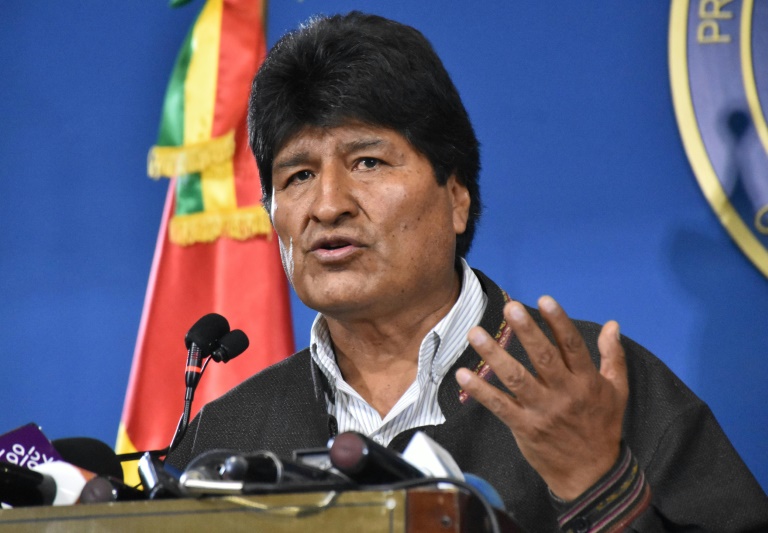
La Paz (AFP) - Bolivia's armed forces agreed on Monday to conduct joint operations with the police to prevent violence as Mexico announced it had granted asylum to Evo Morales, who resigned from the Bolivian presidency on Sunday.
The senator set to succeed him as interim president, Jeanine Anez, pledged to call fresh elections in the troubled South American country.
The United Nations and the Organization of American States (OAS) earlier voiced fears of a breakdown in security in a country that appeared increasingly rudderless after dozens of officials and ministers resigned along with Morales, some seeking refuge in foreign embassies.
"The military command of the armed forces has arranged for joint operations with the police to prevent bloodshed and fighting amongst the Bolivian family," said General Williams Kaliman in a televised address.
Earlier, La Paz police chief Jose Barrenechea called on Kaliman to "intervene, because the Bolivian police have been overrun." Some small police barracks around the country were torched or looted on Monday.
"We are going to call elections," Anez told reporters in La Paz, the seat of government, saying that there will be "an electoral process that reflects the will of all Bolivians," a day after the shock resignation of Morales and his ministers that left the country in a power vacuum.
Morales lost the backing of the military after three weeks of street protests over his disputed re-election for a fourth term.
Anez, a 52-year-old deputy senate speaker, is constitutionally in line to become interim president, and likely to be tasked by Congress to oversee fresh elections and a transition to a new government by January 22.
Lawmakers are due to meet on Tuesday to begin the process.
Tweeting from the central coca-growing region of Chapare, where he fled on Sunday, Morales called on the opposition to "pacify the country" as some of his supporters were violently set upon in La Paz, while a top opposition figure said he feared an imminent mob attack on his home.
Mexico's Foreign Minister Marcelo Ebrard said he had received a call from Morales "to verbally and formally request asylum in our country" and that the request had been granted.
A Mexican military plane bound for Bolivia has stopped off in Peru and continued its journey to pick up Morales, the Peruvian foreign ministry said.
On Monday AFP reporters said hundreds of Morales supporters were marching on La Paz from its satellite town El Alto as opposition leader Carlos Mesa claimed on Twitter that "a violent mob" was heading for his home to attack it.
Morales supporters arrested
AFP photographers saw civilians making arrests after tussling with Morales supporters in La Paz, sometimes assisted by police.Some of those arrested were made to kneel in the street, hands behind their backs. Some were bloodied.
Shops and offices in La Paz were shuttered on Monday in the wake of looting that broke out late on Sunday in some parts of La Paz and El Alto.
The police -- largely confined to barracks since riots broke out on Friday, with many units joining the protests -- were returning to the streets, police chief Vladimir Yuri Calderon said.
Several of Morales' ministers and top officials resigned after his announcement -- including many who sought refuge at the Mexican embassy -- raising the question of who was in charge, given that vice president Alvaro Garcia Linera also resigned.
Under the constitution, power then passes to the president of the Senate and the speaker of the lower house of Congress, in that order.But they have resigned, too.
Anez stepped in on Sunday to say she would assume the presidency, given her position as deputy senate leader.
'Assume responsibility'
The 60-year-old Morales announced his resignation in a televised address on Sunday.The streets of La Paz immediately exploded in celebration, with jubilant Bolivians waving the country's flag, but violence and vandalism later erupted overnight there and in El Alto.
Morales, a former coca farmer who was Bolivia's first indigenous president, said his opposition rivals, Mesa and Luis Fernando Camacho, "will go down in history as racists and coup plotters."
Morales also wrote that "violent groups" had attacked his home.
US President Donald Trump hailed Morales's resignation as a "significant moment for democracy in the Western Hemisphere," and praised the role of the country's military.
"These events send a strong signal to the illegitimate regimes in Venezuela and Nicaragua that democracy and the will of the people will always prevail," Trump said, referring to two other leftist Latin American nations targeted by his administration.
Irregularities
Morales defended his legacy on Sunday, which includes landmark gains against hunger and poverty and tripling the country's economy during his nearly 14 years in office.
He gained a controversial fourth term when he was declared the winner of the presidential election by a narrow margin.
But the opposition cried foul and three weeks of street protests ensued, during which three people died and hundreds were injured.
An OAS audit of the election found irregularities in just about every aspect that it examined.
Morales called new elections but commanders of the armed forces and police backed calls for his resignation.







